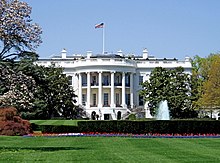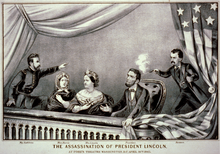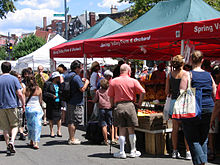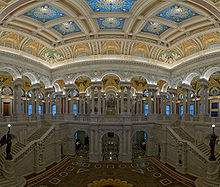Wikipedia:Wikipedia Signpost/2011-01-24/WikiProject report
Life Inside the Beltway





This week, we visited WikiProject District of Columbia which covers Washington D.C., the capital district of the United States and home to over 600,000 residents (more than the entire state of Wyoming). The project began in April 2007 and has grown to include 23 pieces of featured content and 44 good and A-class articles. WPDC is also home to a collection of featured and valued pictures. Members contribute to the Washington D.C. Portal and, because of the national importance of many monuments and institutions within the District, frequently see their content on the United States Portal.
We interviewed four members of WikiProject DC. epicAdam lives and works in the District. His general interest in his hometown's history and culture motivated him to help bring the main Washington D.C. article up to featured article status. Missvain lives in the Logan Circle neighborhood of the District and has made it her goal to document all public art in DC as part of WikiProject Public Art. She made a presentation at last weekend's WikiXdc event. Kumioko lives in Virginia but works in DC and is interested in the history of the area. SchuminWeb is an admin who lives in suburban Maryland, but works and spends much of his time in the District. He founded WikiProject Washington Metro and did most of the writing for October Rebellion and Fraser Mansion, bringing both of them up to Good Article status.
What kind of DC articles do you typically focus on?
- epicAdam: I work mostly on aspects of history, politics, culture, and transportation that relate to the city as a place, not just as the capital of the United States.
- SchuminWeb: I work on a lot of public transportation articles, as well as a few pockets here and there of DC-related stuff.
- Kumioko: I work primarily on biographies but lately I have been working in a wide array of areas trying to clean up and build up the articles relating the DC and the United States in general.
- Missvain: The majority of my work revolves around public art in Washington and the stories behind them.
Does the District's prominence as a tourism destination help or hinder the project's efforts to provide good photography with each article?
- epicAdam: It both helps and hinders. It is certainly a help when it comes to finding pictures of the National Mall, federal buildings, museums, monuments, etc. However, those areas comprise only a very small portion of the city, which leaves much of the city un-photographed. In addition, there are many images of the same location which gives variety in artistry, but a small range of options in terms of photo content that can actually be used in the article.
- SchuminWeb: For those areas that are touristy, sure, the tourist traffic could only help in getting photos. However, for much of the city, one wouldn't really venture over some of those ways as a tourist. That is where it's more like any other city, in that you're going to have someone local do the photographing because they're familiar with it.
- Missvain: No problem for me. I have a photography background and feel comfortable fighting the crowds, luckily, that's rarely a problem for me. I do not have a car though, so, I have to often rent one to get to some of the places I document.
How far does the project's scope extend? Are neighboring areas of Virginia and Maryland included in the project?
- epicAdam: The general consensus has been to restrict the project's scope to the District of Columbia itself and I agree with that approach. Clearly, there are certain people, places and things in Maryland and Virginia that are essential to the understanding of the District and therefore can be included within the WikiProject DC's scope. However, the vast majority of content associated with Maryland and Virginia can be best covered by their own respective WikiProjects.
- Kumioko: I agree, although it might be a possibility in the future to create a project or task force that covers the entire metro area. I think its best to leave DC with DC things. A couple exceptions I could think of might be the Pentagon and Arlington Cemetery but for the most part the scope is fine as it is.
Does the project collaborate with any other projects that share a DC basis?
- Kumioko: I have seen collaboration between Washington Metro, United States, Virginia and Maryland but that's about all I can think of. There are projects for the Smithsonian Institution and Library of Congress that could and will play a role in the DC project.
- Missvain: I do write articles about Smithsonian objects and the basis for my project revolves around the SIRIS database documentation of sculptures the Smithsonian did in the 90s. I am hoping to get more involved in the GLAM projects.
There has been some discussion about consolidating WikiProject DC's assessment and tagging functions with WikiProject United States. How will this affect the project? Do you foresee similar integration occurring between WikiProject US and the projects covering each of the 50 states?
- Kumioko: WikiProject DC has already been added to {{WikiProject United States}}, the {{WikiProject District of Columbia}} replaced with the WPUS/DC banner and displayed prominently at the top of the WPUS landing page. This was done for several reasons after consulting the other members of the DC project and after discussing the issue on the projects talk page. With that said, WikiProject District of Columbia is its own project and runs autonomously from WPUS. The two projects are not merged nor does DC fall "under" US. It just shares the banner template and WPUS helps support it because it has a much bigger pool of members.
- SchuminWeb: I originally was wary about the idea, but then was assured that the DC project pages would not be merged out of existence, since a big entire-US project talk page would be way too large to handle. If adding some structure above the DC-level project gets more eyes on the articles and leads to great improvements, then that's probably a good thing. DC would seem to be a good testing ground for this, since it is a project with a smaller scope, and if it works well for the DC project, one would think that it would work for the other state WikiProjects.
- epicAdam: I am rather against combining WikiProject DC with WikiProject United States. To do so continues a misguided notion that the only reason the District is important is because of its status as the nation's capital. It has been my focus to reveal Washington as a city with real people who live and work here, many of whom have no connection to the federal government whatsoever. In my mind, WikiProject United States is so broad in scope that to try and integrate local WikiProjects under its purview would be a useless effort.
Next week, we'll follow clans of feral cats into battle. Until then, read previous issues of the Report in the archive.


Discuss this story